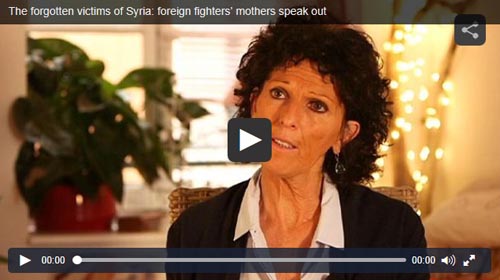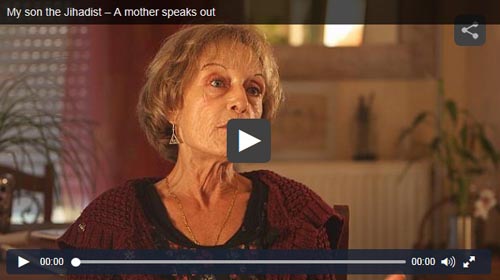Earlier this year, the Euronews network aired a short documentary film titled The forgotten victims of Syria: foreign fighters’ mothers speak out by Robert Hackwill.

This was accompanied by another short interview titled: My son the Jihadist – A mother speaks out produced by Anne Devineaux.

These films reveal the distressing situation of that group of victims of ISIS who are too easily demonized or forgotten. The films, and others like them, focus on the stories of mothers of the young people who were deceived into travelling from Europe to Syria and, once there, embroiled in a hideous deadly fight which bears no relation to their past lives and relationships.
Some of the mothers already know that their children have been killed in the fighting. Some are still in contact with theirs. Other mothers have no idea about the whereabouts of their children and have no means of getting in touch with them. They simply wait day and night to hear something of their loved ones.
These mothers describe young people who had normal and comfortable lives in Europe. Some had no Islamic background and as converts had no other Muslims in their families. But they all believed they were following a glorious cause and they believed they and others would change the world into an ideal place in which they could practice their faith without the distractions of western lifestyles. With this mentality they were easy prey for those who seek to exploit them, terrorist leaders who will commit any crime and atrocity for their own benefit. These young people became victims of cultic abuse which has caused their mothers a great deal of suffering.
This is reminiscent of the mothers of the people deceived by the Mojahedin-e Khalq Organization (MEK aka Rajavi cult) over three decades. As a result of deceptive recruitment, they were taken to bases in Iraq to commit terrorist acts against their homeland. They are also victims of cultic abuse and remain psychological and physical prisoners of the cult leader Massoud Rajavi, some in Iraq, some now in Albania. Similarly, their mothers are denied contact with them and do not know anything about their mental and physical welbeing.
These mothers, however, are even more forgotten and isolated since the likes of Euronews do not portray their stories as they have those of European mothers and they have no means to let world public opinion know about their situation. These mothers, unlike those in Europe, actually do know the whereabouts of their children. They have even travelled to find them and got within 100 metres of their base, but were still denied contact with their loved ones by Rajavi. In spite of this, the officials of the UN and other international organizations could easily arrange for them to meet with their loved ones inside the MEK camps in Iraq and in Albania except that for simple expediency they yield to Rajavi’s demands and deny the mothers this basic right.
Who should raise the voice of these most forgotten mothers and let the world know about them? It seems the UNHCR is determined to close their eyes to their plight and talk and collude only with the cult leader Massoud Rajavi. The bias is so brazen that we are entitled to ask what benefits accrue to those who knowingly ignore the rights of these mothers?
Is there any reason why the mothers of MEK members in Iraq and Albania cannot have the same access to publicity in order to try to win public sympathy as the mothers in Europe? When they travelled to Iraq after 2003 and braved war and chaos these mothers were supported by former members and a few human rights activists, but their efforts attracted little media interest. Surely there is nothing to stop European mothers joining with them in common cause, to tell the world “We need to be recognised as victims, not the families of terrorists”.
Iran Interlink,

